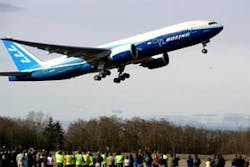Boeing Profits Decline on Higher Expenses
CHICAGO (AP) -- Boeing Co. on Wednesday reported a 14 percent drop in its first-quarter profits as higher spending on deferred compensation and pension expenses offset gains in its military contracting and airplane manufacturing businesses.
The Chicago-based aerospace company said that earnings in the January-March period were $535 million, or 66 cents per share, down from $623 million, or 77 cents per share, a year earlier.
Results included charges of 7 cents per share related to the disposal of Boeing's venture capital investments and the sale of its Electron Dynamic Devices business, as well as a gain from tax adjustments totaling 14 cents per share.
Excluding those items, such as income from discontinued operations, Boeing said earnings from continuing operations amounted to 64 cents per share. Analysts surveyed by Thomson Financial had forecast 55 cents per share.
Revenue for the quarter was $13 billion, up 0.7 percent from $12.9 billion but short of Wall Street's estimate of $13.3 billion.
Despite a 17 percent decline in earnings from continuing operations, interim chief executive officer James Bell said the first-quarter results ''reflect continued strong operational and financial performance across our businesses.''
Bell, who remains chief financial officer, was named last month to temporarily fill the top spot while Boeing looks for a successor to Harry Stonecipher. Stonecipher, who was set to retire next year when he turns 70, was forced to resign as a result of unspecified improper behavior during a brief affair he had this year with a female company executive.
Boeing said its spending was significantly higher in part because of a $126 million increase in share-based-plans expense, reflecting the vesting of performance shares and the adoption of a required new accounting methodology for estimating those expenses.
It also more than tripled its pension expense from a year earlier, to $223 million, partly because of charges related to the sale of Electron Dynamic Devices.
Boeing's defense contracting business, headquartered in St. Louis, remained prosperous. Revenues rose 2 percent to $7.5 billion - 58 percent of the company's total - and operating profits grew 15 percent to $847 million.
The Seattle-based commercial plane-making business saw revenues dip 5 percent to $5.1 billion on a decline in deliveries to 70 from 76 a year earlier. But its operating earnings climbed 11 percent to $389 million.
The company reaffirmed its overall outlook for 2005 and 2006, forecasting strong growth in revenues and earnings and a continued recovery in the commercial airplane market.
Boeing, which has trailed Airbus SAS in airplane deliveries for the past two years, also left unchanged its estimates of 320 deliveries in 2005 and 375 to 385 in 2006. It delivered 285 planes last year.
A flurry of recent orders for its planes has given the company momentum in the competition with its European rival.
Strong interest in its planned new 787 model, which the company says will offer 20 percent better fuel mileage when it enters service in 2008, has helped that resurgence. Analysts say Boeing also is reaping orders after reversing its unwillingness to give airline customers deep price discounts on new planes.
